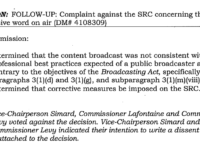Days after Bill C-11 passed in the House of Commons, the CRTC released its decision involving Radio-Canada and the use of the N-word in a broadcast. The decision sparked an outcry in Quebec and raised concerns that the Commission did not feel constrained by the Charter of Rights and Freedoms in its decision. Indeed, given that the majority of the Commission ignored the Charter and freedom of expression altogether, the decision signalled how Bill C-11 could be used to regulate Internet content the CRTC deems contrary to Broadcasting Act policy objectives. Two of the lingering questions with the case involved timing and who had been involved: the complaint had reached the CRTC in 2020, yet the decision was released nearly 18 months later only after Bill C-11 passed the House of Commons. I asked the CRTC for the full commission minutes to better understand who was involved in the case and when the issue was debated and decided. The Commission responded that all of this information was only available through the Access to Information Act. While I find this level of secrecy astonishing – there is no reason for the Commission to not publish who was involved in decisions and to make its minutes publicly available by default – I filed the request.
Archive for September 14th, 2022

Law Bytes
Episode 238: David Fraser on Why Bill C-2's Lawful Access Powers May Put Canadians' Digital Security At Risk
byMichael Geist

June 30, 2025
Michael Geist
June 23, 2025
Michael Geist
Search Results placeholder
Recent Posts
 Canada’s DST Debacle a Case Study of Digital Strategy Trouble
Canada’s DST Debacle a Case Study of Digital Strategy Trouble  Canadian Government Caves on Digital Services Tax After Years of Dismissing the Risks of Trade Retaliation
Canadian Government Caves on Digital Services Tax After Years of Dismissing the Risks of Trade Retaliation  The Law Bytes Podcast, Episode 238: David Fraser on Why Bill C-2’s Lawful Access Powers May Put Canadians’ Digital Security At Risk
The Law Bytes Podcast, Episode 238: David Fraser on Why Bill C-2’s Lawful Access Powers May Put Canadians’ Digital Security At Risk  Ignoring the Warning Signs: Why Did the Canadian Government Dismiss the Trade Risks of a Digital Services Tax?
Ignoring the Warning Signs: Why Did the Canadian Government Dismiss the Trade Risks of a Digital Services Tax?  Why Bill C-2 Faces a Likely Constitutional Challenge By Placing Solicitor-Client Privilege at Risk
Why Bill C-2 Faces a Likely Constitutional Challenge By Placing Solicitor-Client Privilege at Risk

